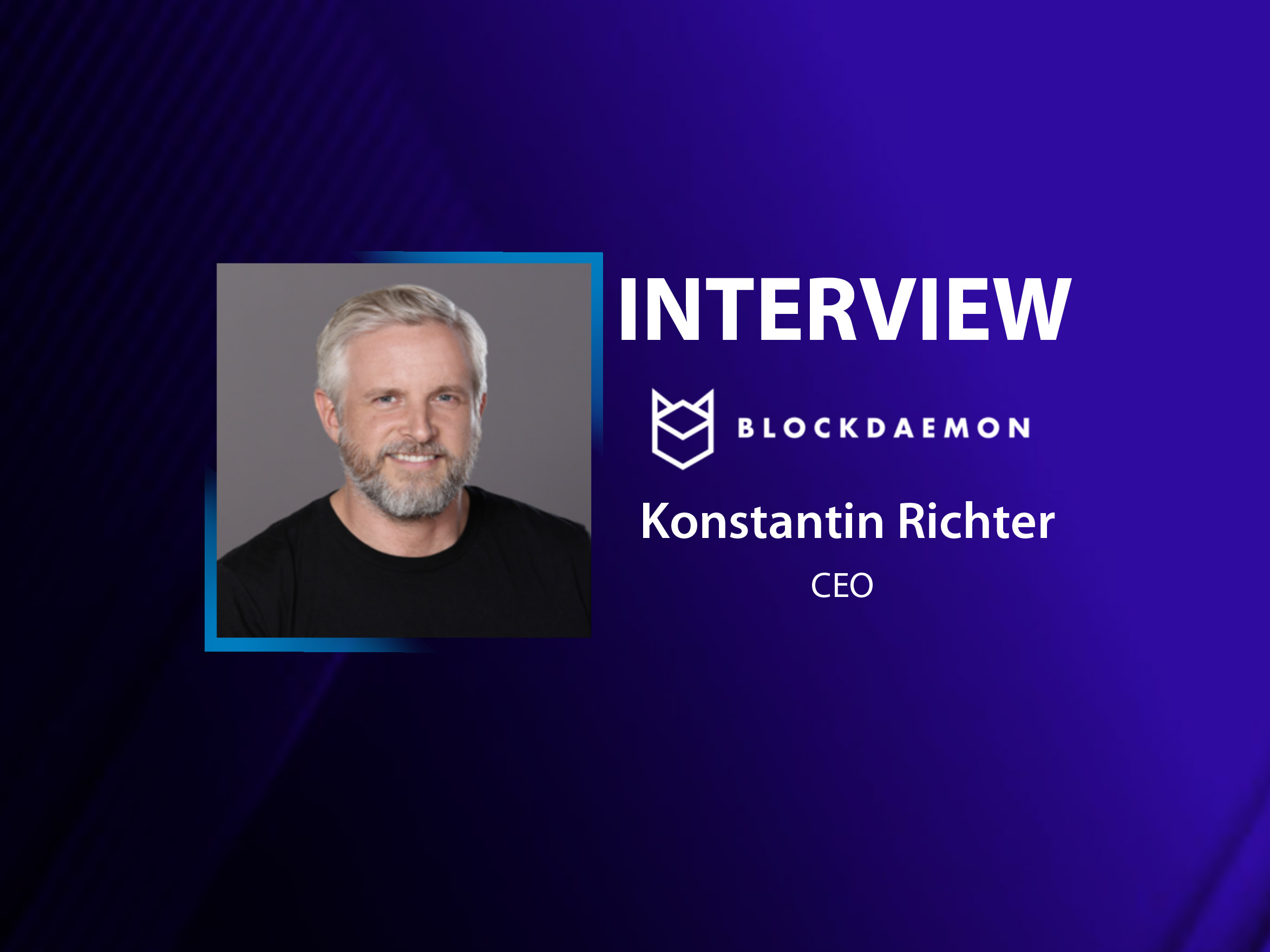Konstantin Richter, CEO & Founder of Blockdaemon shares a few thoughts on the potential of blockchain in tech today while talking about the ways in which fintech boomed in 2020 and why amid the global pandemic. Catch the complete QnA:
____
Can you tell us a little about yourself, Konstantin?
Born in Germany, I was always interested from a young age in connecting people. This passion first took shape in my career in telecoms building out networks. In Germany, I began at Deutsche Telekom and transitioned to T-Mobile International to build out wireless networks, mobile business models, and strategic partnerships. I enjoyed building software strategies across different devices, working at Nokia, my role involved bringing the promise of software to these sort of new distribution channels in a mobile first approach.
I became an entrepreneur around a decade ago, focusing on the concept of content distribution and integrating infrastructure components that host content. I began with music, video content, and photography that got reformatted automatically and pushed in different distribution channels and transcoded. The magic word was network effect, which is when you hit some form of scale that was automated. It led me to building multiple B2B SaaS companies with an emphasis on complex data-models and cloud native architecture, and eventually enter the world of crypto to set up Blockdaemon.
Read More: GlobalFintechSeries Interview with Malcolm Tan, Advisor at KingSwap
How did the idea of Blockdaemon come about? We’d love to hear about the key highlights from the journey and a few upcoming plans for the platform that are in mind?
The idea for Blockdaemon originated from my experience running eth nodes in the middle of 2017, and the realization that doing so was very difficult with the existing infrastructure at the time—none of the conventional cloud-formation tools available in the market could cater to blockchain.
We originally pitched Blockdaemon at Plug & Play in July 2017, secured a place in their accelerator, and received our first investment as pre-seed funding. Plug & Play provided the perfect proving ground to refine our narrative and focus our product. In March of 2018 we raised a $3.275M round led by Comcast Ventures, which we used to begin growing our engineering team, enhancing our infrastructure capabilities, and helping customers run multi-tenant networks across different blockchains.
Blockdaemon offers node operations and infrastructure tooling for blockchain projects, across their life-cycle: early on it is testing, then staking/reporting, clusters for exchanges/custodians and finally APIs for developers. Blockdaemon’s node management platform helps auto-scale blockchain networks securely with enhanced monitoring, back-up systems, HA clusters, APIs and cloud-managed node monitoring of on-premises solutions with our Blockchain Package Manager (BPM). Builders looking to interact with public, permissioned-based, and staking networks can connect to 30+ protocols through the Blockdaemon Marketplace.
In our next phase of growth, we are broadening our vision of infrastructure to include deeper financial reporting and APIs. Additionally, we will be contributing directly to the stability, resiliency and accessibility of payment-centric networks including Transparent Systems, Celo, MobileCoin and the Lightning Network, as well as supporting the success of ETH2.0.
As an entrepreneur; what are your thoughts on the state of fintech startups globally? Can you throw light on a few game changing innovations you’ve come across that young fintech startups have been working on?
2020 has been a significant year for the fintech sector in a number of ways. For a start, the level of institutional adoption of financial technologies including digital assets and distributed ledger technology (DLT) has been unprecedented, with global corporations such as WhatsApp, PayPal and Venmo all announcing plans to incorporate digital currencies into their existing platforms.
As many fintech start ups offer digital services, and incorporate some level of remote working in operations, they have been able to react quickly to the changing business environment and largely continue operations unaffected. I think we are starting to see the next generation of younger fintech start ups already beginning to consolidate their position in the market and build thriving ecosystems. Projects like MakerDAO are capitalizing on the Decentralized Finance (DeFi) boom to bring a wider demographic of users into the crypto economy.
Other major projects that will have a major impact on the sector in their mission to “bank the unbanked” are Celo and Libra. Both platforms offer mobile payment solutions which allow users to send payments through specific messenger tools via SMS or Facebook messenger on their mobile phone. Offering a specific currency and stable token component, these services allow users to choose a currency and send it to someone else with a click of a button. At practically zero cost it provides access to a value system that simply wasn’t previously accessible, and for users in countries where inflation is rampant, provides access to a currency that can truly retain its value.
Read More: Nasdaq Named to Dow Jones Sustainability Index for the Fifth Consecutive Year
What are your thoughts on the future of global fintech and how much of an impact do you think fintech startups have the potential to make in the market?
As the global pandemic has demonstrated, communications and technology will be key to ensuring that we remain connected as a society and able to efficiently conduct business together. Business operations in our society today are global, at Blockdaemon we have team members located across the globe in the US, Ireland, Germany and Singapore. It is clear that now more than ever, it is important that we use the full potential of technology to ensure that we are fully interconnected in terms of how we work together. Successful fintech start ups are at the forefront of innovation in payments, digital assets and networks which will ensure that our global financial system is fit for purpose for generations to come.
What are some of the benefits of blockchain technology today that businesses are still learning about or just starting to open up to?
The global economy has yet to fully embrace the potential of blockchain in revolutionizing the global financial system. The power of blockchain to set up an alternative system of monetary value, outside that of Fiat currency, is tremendously exciting. Blockchain can import a far higher degree of fairness into the governance of monetary systems which does not currently exist in the financial systems of many democratic countries. It is important to note that blockchain is not trying to undermine our current financial system but rather to improve it, and bridge legacy infrastructure with new technologies that can create a better means of financial inclusion and governance.
How have you seen the global fintech market respond to the Covid-19 crisis and closer home at Blockdaemon, what are some of the experiences you’ve had during this time?
The pandemic has demonstrated the importance of both centralized and decentralized systems of operation. Both are important in society and both need to complement each other in order for enterprise to function effectively. Increasingly, companies are looking at how they operate and how they can position themselves to support their employees and mitigate the impact of COVID-19 on operations. Success will be measured by those companies who can continue to identify opportunities to scale and expand. As more services in the financial sector become automated and digitized, it will be important for companies to become better aware of identifying trends for quick decision-making in a post-COVID world.
In terms of how the current crisis has impacted our strategic positioning, it has made us focus more than ever on working with projects that align with our key values and mission. A good example is the fact that we are a founding member of the Celo Alliance for Prosperity, a mission-aligned network of organizations working towards a more inclusive global financial system and fostering social impact and financial inclusion through the use of blockchain technology.
In times of crisis, the health and safety of our team members and family are the first priority of course, and we are grateful that our team has stayed well. We make sure to check in even more frequently to stay connected and aligned. We’ve been a distributed team from the beginning so working remotely across time zones is not new to us, just how we adjust to the changing environment around us.
Given the overview of what fintech looks like today in 2020 and this evolving space: how would you describe this market over the next decade?
The impact of financial technology in our society is already clear. Adoption of blockchain technology by governments, institutions, and global corporations is at a peak that we have never seen before. As these use-cases move from early development stages to mature solutions, we will see substantial changes in how our financial system operates and the role currency plays in our society.
As more and more fintech solutions move to advanced stages of maturation and implementation, we will see increased demand for the infrastructure services needed to support and streamline enterprise capacity to scale up services.
Before we wrap up, would you like to share a few top fintech startup learnings
There are a few key insights which I believe are more important than ever in the current business climate. One is to focus aggressively on one core business dimension, this can help get traction quickly with a strong narrative that is ambitious, yet needs little initial investment.
Read More: GlobalFintechSeries Interview with Humayun Sheikh, CEO and Founder at Fetch.ai
Building a strong operational track record is also important. As blockchain based use-cases grow and mature, there is ever increasing levels of institutional adoption and investment in the sector by large corporations which want to see strong and consistent levels of growth and performance by blockchain companies they are considering as partners.
Maintaining the momentum of a company’s growth during this challenging period can also be difficult, particularly in communicating confidence to investors unsettled by the economic uncertainty. Keeping lines of communication open, and regularly reviewing financials can help maintain investors’ confidence during such a challenging business environment.
Blockdaemon is a blockchain node infrastructure platform internally ISO 27001 aligned with enterprise-grade security and backup systems. Supporting 30+ protocols, 70 out-of-the-box node types, and monitoring plug-ins for cloud and on-prem services, Blockdaemon is used by exchanges, custodians, enterprises, financial institutions and 10k+ developers to connect commercial stakeholders to blockchains.
Konstantin is a serial entrepreneur and investor. He has led several SaaS B2B companies towards meaningful exits in the media/advertising space, most notably, Audiotube, Lookbooks and Wiredrive. He also is an advisor to blockchain company Gem, and serves on the board of MadHive, a leading media/advertising blockchain business, genymobile, the leading android dev tool and dnastack.com, the complete genomic search-engine. He currently serves as the CEO and founder of Blockdaemon, the most flexible hybrid cloud middleware platform for major blockchain protocols.
Explore the State of Technology Sales and Tips to Streamline Marketing and Sales Efficiencies with Leaders from Zilliant, Pipedrive, TeamViewer, Acoustic and more!

